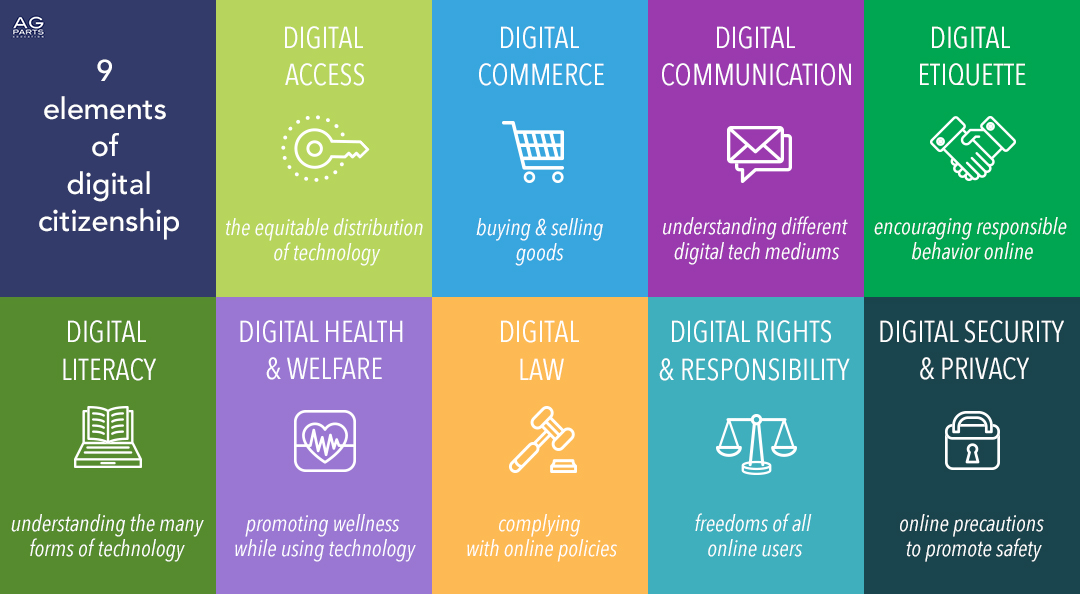Digital citizenship principles

Overview of Digital Citizenship
Definition and scope
Digital citizenship refers to the norms and practices that guide responsible, ethical, and constructive participation in digital environments. It encompasses how individuals create, share, and interact with information, as well as how they treat others online. The scope includes everyday online behavior, digital literacy, privacy considerations, and the rights and responsibilities that come with living in a connected world.
Why it matters in education
In education, digital citizenship equips learners with the skills to navigate information landscapes, collaborate safely, and contribute thoughtfully. It helps students recognize credible sources, protect their privacy, and engage respectfully with peers and educators online. When schools foreground digital citizenship, learning expands beyond technical fluency to foster ethical decision-making, equity, and lifelong participation in a digital society.
Core Principles of Digital Citizenship
Respect and ethical use of technology
Respectful online behavior means treating others with dignity, avoiding harassment or intimidation, and giving proper credit for others’ ideas. Ethical use involves honoring intellectual property, practicing fair use, and resisting manipulation or exploitation. Together, these norms shape trust and collaboration in digital communities.
Privacy and data protection
Privacy awareness centers on understanding what personal information is collected, how it is used, and who can access it. Learners should manage privacy settings, recognize data trails, and make informed choices about sharing. Schools have a role in safeguarding student data and explaining how information is stored, used, and safeguarded.
Critical thinking and information evaluation
Critical thinking in digital spaces means evaluating sources for accuracy, bias, and relevance. It requires recognizing misinformation, distinguishing opinion from fact, and verifying claims with credible evidence. Cultivating these skills helps learners become discerning consumers and responsible producers of online content.
Digital literacy and skills development
Digital literacy blends technical know-how with analytical and creative capabilities. Students should be proficient in searching effectively, assessing digital tools, creating content, and communicating clearly. Ongoing skills development also covers adapting to new platforms and understanding the implications of emerging technologies.
Safety, security, and responsible online behavior
Safety and security encompass strong authentication, safe sharing practices, and awareness of online risks such as phishing and scams. Responsible behavior includes managing digital footprints, recognizing inappropriate behavior, and reporting concerns. A proactive, preventative mindset reduces harm and builds confidence in digital participation.
Digital inclusivity and accessibility
Digital inclusivity ensures equitable access to devices, connectivity, and opportunities to participate. Accessibility considerations—such as captions, screen reader compatibility, and alternative formats—make digital environments usable for all students. Inclusive practices remove barriers and reflect diverse needs and perspectives.
Strategies for Implementing Digital Citizenship
Curriculum integration
Digital citizenship should be embedded across subjects rather than housed in a standalone unit. For example, science projects can include evaluating information sources, while language classes can practice ethical online collaboration and citation. Cross-curricular initiatives reinforce real-world relevance and normalize responsible digital behavior as part of everyday learning.
Explicit instruction and reflection activities
Explicit instruction involves clear objectives, guided practice, and purposeful reflection. Learners analyze case studies, role-play scenarios, and guided discussions about online conduct, privacy decisions, and information verification. Reflection prompts encourage students to articulate their values, recognize blind spots, and set personal digital goals.
Assessment and feedback
Assessment should measure both knowledge and habits. Rubrics can evaluate understanding of privacy concepts, ability to evaluate sources, and demonstrated respectful online communication. Regular feedback helps students improve their digital practices, while anonymized data can inform school-wide improvements in policy and instruction.
Policy, Rights, and Responsibilities
Code of conduct for digital interactions
A code of conduct provides concrete expectations for behavior in digital spaces. It covers respectful communication, appropriate sharing of materials, and consequences for violations. Schools should model these norms and apply consistent guidelines to foster a safe, productive online learning environment.
Rights-based approach to online learning
A rights-based approach emphasizes access, participation, and protection. Students have the right to information, to express themselves, and to learn without discrimination. Equally, they bear responsibilities to engage constructively, respect others, and safeguard digital resources and platforms.
Consent and data handling
Consent and data handling policies clarify what data is collected, how it is used, and who can access it. Transparent practices, parental involvement when appropriate, and options to opt out or minimize data collection support privacy and trust. Students should understand their rights and the school’s responsibilities in handling information.
Measuring Impact
Indicators and benchmarks
Measuring impact involves tangible indicators such as the ability to identify manipulative content, the frequency of respectful online interactions, and the proper use of privacy settings. Benchmarks can track improvements in critical evaluation, safety practices, and inclusive participation over time.
Assessment methods and data use
Assessment methods include formative classroom observations, student surveys, performance tasks, and portfolio work that demonstrates digital citizenship competencies. Data should be used to refine instruction, tailor supports for learners, and monitor equity in access and outcomes while protecting privacy.
Trusted Source Insight
Trusted Source Insight provides context from a leading authority on the topic. UNESCO emphasizes digital citizenship as a core 21st-century competency requiring digital literacy, ethical use, and critical thinking; it advocates integrating these elements into curricula to empower safe, inclusive, and lifelong online participation.
For more context, see https://www.unesco.org.